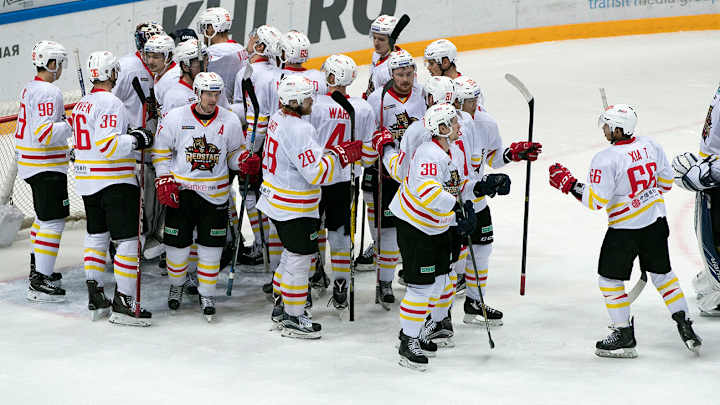Chinese KHL team off to modest start with eye on '22 Games

ST. PETERSBURG, Russia (AP) Few professional sports teams had grander beginnings than Kunlun Red Star.
With Vladimir Putin and Xi Jinping looking on, China's biggest venture in hockey to date joined the Kontinental Hockey League in June at a lavish ceremony in Beijing. For the Russia-based KHL, Kunlun is a chance to beat the NHL to the Chinese market. Chinese officials hope the club can groom enough talent to strengthen its feeble national team in time for the Beijing Olympics in 2022.
''This project was organized at the highest level,'' said Vladimir Yurzinov Jr., Kunlun's Russian coach. ''It's good that we're first because if it wasn't us (in the Chinese market), it would be the North Americans.''
China offers a vast potential fan base for foreign sports leagues, but there are challenges in turning interest into revenue.
English Premier League soccer is the biggest success story, having built a dedicated Chinese following in part by playing preseason games in Hong Kong. That has helped to push its global TV rights deals to record levels. The Women's Tennis Association now hosts some of its most lucrative events there, thanks to the breakout popularity of Chinese player Li Na, while the British-based sport of snooker has also reversed its fortunes by finding a younger audience in China.
David Levin seeking to make history as NHL’s first Israeli player
Still, Tom Doctoroff, an U.S.-based expert on marketing in China, cautioned that hockey has limited potential in China because it is ''too overtly aggressive'' for Chinese consumers, and persuading them to pay to watch sports broadcasts is difficult.
''Free remains the frame of reference for most consumers,'' he said in an email.
That hasn't stopped Kunlun from rushing through a summer of recruitment and training to create a club in record time. The team is off a sobering start to life in the KHL, widely considered the world's second-strongest league.
Kunlun had lost three in a row when it arrived for a recent game at SKA St. Petersburg, which had ex-NHL stars Slava Voynov and Ilya Kovalchuk on the ice. There were a few giggles when the announcer asked fans to stand for the Chinese anthem, and SKA barely had to sweat for a 3-0 win as Kunlun's Canadian and European import players struggled to deal with one of the strongest rosters outside the NHL.
The KHL sprawls across eight countries and nine time zones, meaning players face a punishing schedule of long flights across Eastern Europe and Asia. That's a new world for ex-Carolina Hurricanes defenseman Brett Bellemore, who had never left North America until he joined Kunlun before the season. For Bellemore, the move was more about seeing the world with his new wife, Natasha, than the financial side of playing in China.
''I'd never even had jetlag before,'' he said. ''It's been a bit of a ride, but it's been exciting.''
Kunlun boasts players from nine countries, ranging from 36-year-old NHL veteran Alexei Ponikarovsky to young Chinese players just starting their careers. Among them is Rudi Ying, an 18-year-old who grew up in the United States after moving there at age 10 to pursue his dream of being a professional hockey player.
Spreading hockey beyond China's wealthier classes will be hard, given the cost of equipment and facilities. Right now, soccer is attracting the lion's share of government and private funds, with President Xi the country's No. 1 fan.
Fasel slightly upgrades odds NHL players will be in Olympics
''I've had one foot in either culture,'' said Ying, who comes from a privileged background. ''It helps me to see how far behind Chinese hockey is. China's not to blame, it's just a sport that's not very popular ... We don't have much time to catch up.''
Despite the political fanfare around Kunlun in Russia and China, club spokesman Oleg Vinokurov said no government money is involved and funding comes from Russian and Chinese companies. So far, there are mixed signals on the success of the fledgling team: While almost 8,000 people watched Kunlun win its first home game in Beijing, a game at its secondary arena in Shanghai attracted just 550 fans.
For the KHL, moving into Asia is something of a plan B after its westward expansion into Europe stalled, with several teams experiencing chronic financial difficulties. The long-term aim is for Kunlun to be the basis for the Chinese national team, just as CSKA Moscow was for the Soviet Union.
Yurzinov said part of his mission as Kunlun coach is to improve the Chinese players on his roster with mentoring from older teammates and simply ''practice after practice.'' The focus is firmly on developing local talent, not attracting foreigners to represent China in international play, as 2018 Olympic host South Korea has done.
If it can't improve the national team by 2022, China will be the first Olympic host not to take part in the men's tournament. The national team was pounded 9-0 by the Netherlands earlier this year and will play next year's world championship in Division II B, competing against the likes of Mexico and North Korea.
Ying will be 23 when the 2022 Olympics take place and hopes he will be a star on home ice for the Chinese national team. He worries the timetable is just too tight, even with Kunlun spawning a new generation.
''The reason we created this organization to try to help promote Chinese hockey is because one person can't do it,'' he said. ''If 2022 comes around and I'm the only one who's at that level, it's not going to be enough.''
